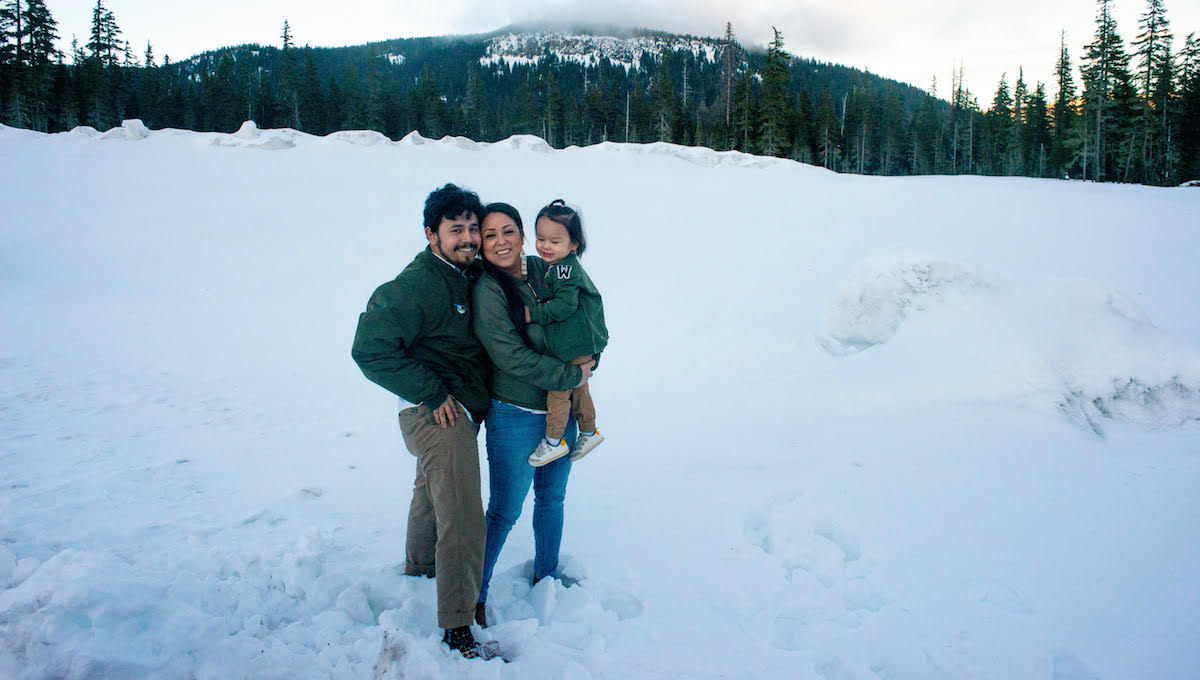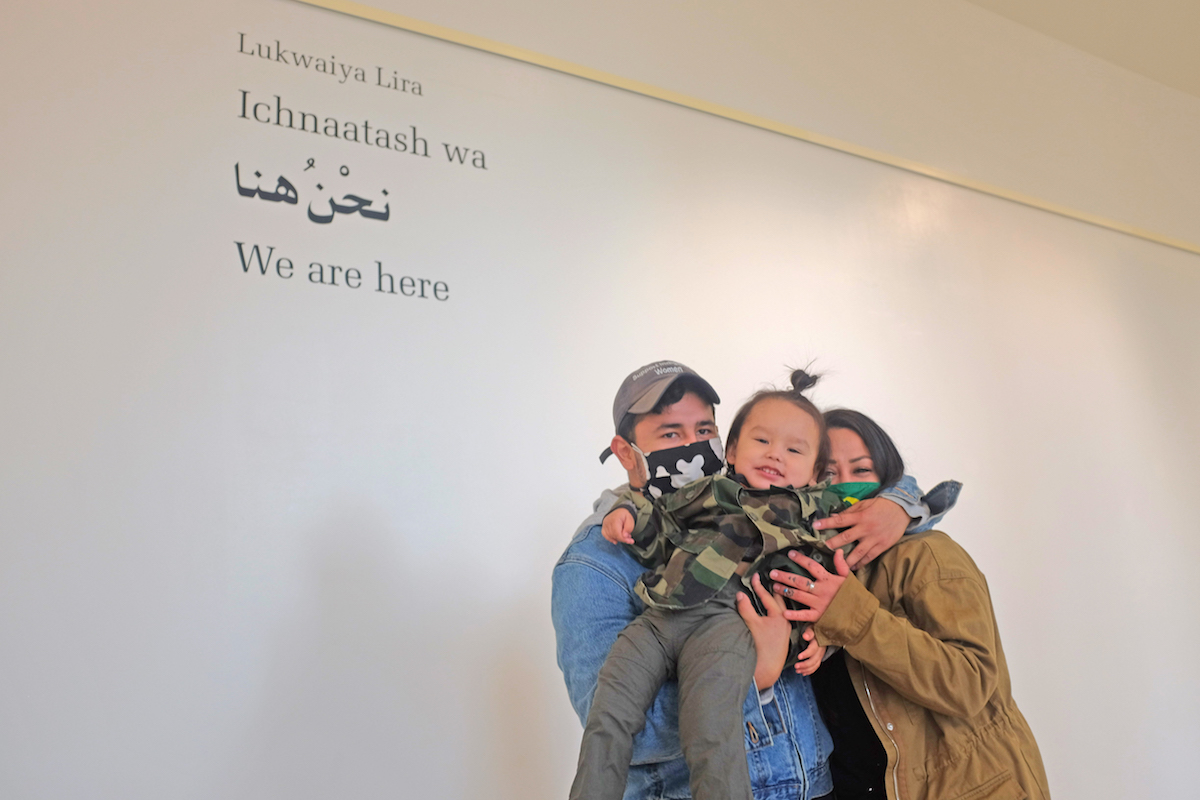You’ve said that you aim to use teachings from your upbringing in your work to transform the world toward a more equitable and sustainable future. Can you share what you mean?
It’s so interesting—I look at my own identity and see how it plays into the world. I'm enrolled in the Confederated Tribes of Warm Springs and I grew up on the reservation, but I'm half white. Now that I'm an adult, I realize there was privilege in being white-passing and coming from a family where going to college was normal. At the same time, there’s privilege in the fact that I was raised in traditions and I understand the world from a different viewpoint. I was raised traditional in the longhouse, gathering our first food, understanding our ceremonies and our beliefs.
When you come from this kind of community, where we have been able to maintain spiritual beliefs and a different worldview, you're able to see the world differently. Even things like money—the word for money in our language is xaxáyk and I was always taught that it was a completely made up idea. I didn't know the term ‘social construction’ until college, but I knew what it meant my whole life because I always understood that there are better, more communal ways of living that aren't just about greed and money and power.
When I was elected to Tribal Council, I saw how we have to operate under a modern-name government that was set up for us, with a kind of self-determination that isn’t intentional about our values, our beliefs, or what our Tribe wanted and maintained. And this plays out in our water: our Tribe didn’t build capital accounts because we don’t tax people for things that we consider needs. Water is the most sacred thing in our longhouse—you begin and end with water. You say chúush and everybody drinks a sip of water and you acknowledge it. It's like the force of life. But to access state funds for new infrastructure, we have to tax the water. And to our elders, it's completely not okay to charge our people for clean water.
This has gone on for years and years. Do we continue to bend and be colonized and go directly against our spiritual beliefs in order to just survive in today's world? So it’s about having different worldviews, different abilities to vision, the ability to imagine the future together. We need to actually encourage different voices and perspectives, and not continue to expect them to jump through the same hoops. Don’t make us prove what we know or come up with all the solutions or always fight from survival mode.
You’ve worked as an early childhood educator, and your mom did too. How has that influenced you?
As a young kid, I grew up really understanding the importance of community in early childhood development. Not just making sure that kids have their basic needs met, but also that their cognitive, social, emotional, intellectual needs are also being met.
Even beyond my mom, my great-grandmother was a matron for our boarding school. She was a full-blooded Native woman, which was complicated. But elders today will tell me stories about how when they were kids in that boarding school, she would still talk to them in our language, and had a natural understanding that kids learned in different ways. That wasn't necessarily an Individualized Education Program (IEP) or diagnosing learning disabilities, but just tailoring play and the way that you interacted with kids. That was very natural.
When I became a Head Start educator, I learned about the domains of child development and the nuts and bolts of education. I looked at child-led and Montessori models, where kids have the kind of high-level play that really blasts your development: nature-based play, a lot of music, hands-on learning with food... And I started to recognize that a lot of what we see in these super fancy schools are exactly what happens in traditional child-rearing. It’s how grandparents care for children while parents are providing. I can see these trends because they’re how I was raised.
You were an elected member of the Warm Springs Tribal Council. You ran for the Oregon Senate last year. What has motivated you to serve in public office?
Growing up here, I graduated from Madras High School. I played sports, I did extracurriculars, I could fit into different roles. But there was always racism and my education never taught me how to recognize it, let alone advocate for myself. So as I became an adult, I started to unpack my identity and realize how much is normalized out here just to survive.
After college, I had my own big dreams. But as life goes on, when you see people suffering and systems failing a community over and over again, you can't just keep walking away. So I came home and worked for our Children's Protective Services here in Warm Springs. That gave me a good look at our core systems in the state, like social services and education. And again, I watched cycles repeating over and over. That led me to look at funding, resourcing, and so many pieces I didn’t yet understand.
So when I decided to run for our Tribal Council, I was really trying to start conversations that others weren't starting. Conversations that were almost taboo, like legalizing marijuana. And I won. I spent three years on the Council and worked on a wide range of issues because of my diverse background. And running for State Senate was just an extension of that initial work on the frontline—seeing how our most impacted communities were still not being resourced, listened to, planned for, nothing—because I'm from those communities.
A huge part of my identity is growing up in these woods, with my grandparents, with my community, with my people. And I want that for my son. But that also means he might have to go to high school with some people who grow up thinking that immigrants don't have a right to happiness or think that Natives just get free handouts, even though they’ve grown up here next to us. So it's not a choice for me to be in politics. It's not a choice for me to organize. When I’m running for office, it’s really for change. And I want to show others who might be like me that we do exist, that it's okay to be progressive and expect something better than just survival.

